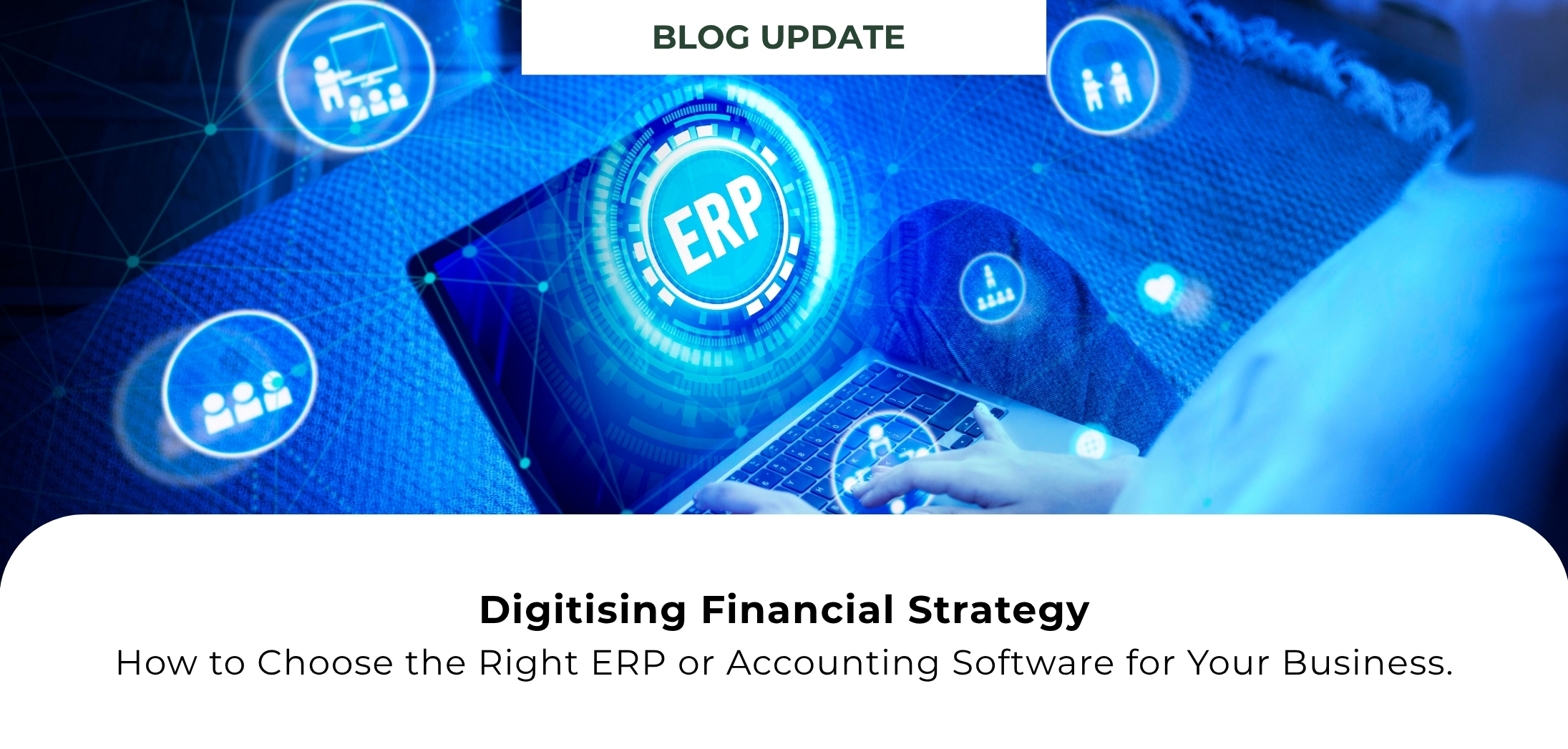
In today’s dynamic business landscape, efficient financial management is not just a competitive edge — it’s a core necessity. For organisations operating across trade, commerce, or services, the foundation of this efficiency lies in choosing the right accounting software or Enterprise Resource Planning (ERP) system.
Modern businesses demand accuracy, real-time insights, compliance readiness, and scalability. This guide walks you through the strategic considerations needed to select the ideal financial co-pilot for your enterprise. The Indispensable Value Proposition of Digital Financial Systems
Before diving into how to select a solution, let’s reaffirm why adopting or upgrading to a digital financial system is essential:
1. Enhanced Accuracy & Automation
Eliminate manual errors and automate repetitive tasks like invoicing, ledger postings, and reconciliations. This enhances data integrity and reduces human intervention.
2. Real-Time Financial Visibility
Access up-to-the-minute financial data — from cash flow to segment profitability and outstanding receivables — to drive faster, data-backed decision-making.
3. Streamlined Compliance
Comply effortlessly with Indian tax laws like GST, TDS, and others using automated calculations, report generation, and filing features. This reduces compliance risks and penalties.
4. Operational Efficiency
Minimise manual data entry, reduce turnaround time for reporting, and allow your team to focus on strategic growth instead of administrative burdens.
5. Scalability & Growth Enablement
Choose a system that can grow with you — one that handles increasing transaction volumes, multiple branches, or complex workflows with ease. Accounting Software vs. ERP: Understanding the Scope
Accounting Software typically focuses on core financial operations such as bookkeeping, invoicing, and reporting.
ERP Systems go beyond accounting — integrating inventory, procurement, HR, payroll, and compliance — offering a comprehensive view of enterprise operations.
For businesses with multi-departmental operations, regulatory obligations, or cross-functional workflows, an ERP often provides greater value. Key Criteria for Strategic Software Selection
Here are the critical areas to evaluate before making your selection:
1. Functional Requirements Alignment
Industry Specificity: Do you need features like batch tracking for manufacturing, project billing for services, or POS integration for retail?
Core Accounting Modules: Ensure coverage of general ledger, payables, receivables, banking, fixed assets, and multi-company support.
Inventory Management: Look for inventory tracking, warehouse management, costing methods (FIFO/LIFO), and reorder levels.
Payroll & HR Integration: Check for Indian payroll compliance (PF, TDS, ESI) and HR workflow integration.
Reporting & Analytics: Can it provide dashboards, customizable reports, and drill-down capabilities for better financial insights?
2. Scalability & Future-Proofing
Transaction Load: Can the system handle your projected volumes without slowing down?
User Access: Does it support multiple users with secure, role-based access?
Modular Expansion: Can you add new modules/features in the future?
3. Ease of Use & Implementation
User Interface (UI): A clean, intuitive interface reduces training needs and errors.
Implementation Resources: Evaluate the time, cost, and team effort required for setup, migration, and training.
Vendor Support: Opt for vendors with clear onboarding and implementation frameworks.
4. Integration Capabilities
Ecosystem Compatibility: Ensure it integrates with your CRM, e-commerce platform, banking, payment gateways, and GST filing utilities.
API Availability: APIs allow for seamless data exchange with third-party tools.
5. Total Cost of Ownership (TCO)
Licensing Model: One-time purchase vs. SaaS subscription — which aligns with your budget?
Hidden Costs: Consider implementation, customisation, training, AMC, and hardware upgrades.
ROI Assessment: Balance the cost against potential gains in efficiency, accuracy, and strategic agility.
6. Security & Data Governance
Security Protocols: Look for encryption, user access controls, backup policies, and disaster recovery.
Data Portability: Ensure you have full ownership and can export data if switching systems.
Compliance: The system must align with India’s data privacy and IT security norms.
7. Vendor Ecosystem & Support
Support Channels: Ensure reliable support via phone, chat, email, and localised partners.
Training & Documentation: Are manuals, tutorials, and user guides easily available?
Community & Updates: A strong user base and consistent updates signal a vendor’s commitment to improvement.
Choosing an ERP or accounting system is a strategic decision, not just a technological upgrade. It’s an investment in your business’s financial clarity, operational efficiency, and long-term scalability.
Thorough due diligence, clarity of business needs, and professional advisory input are essential. Engaging with experienced professionals — like our team — ensures your selection aligns not just with today’s requirements, but tomorrow’s growth.
© 2026 Business Consultant & Law Firm - Legacy Partners. All Rights Reserved.
Designed by Nuewelle Digital Solutions LLP

Legacy Partners
We typically reply in a few minutes